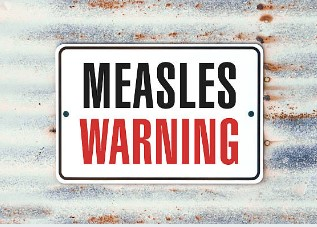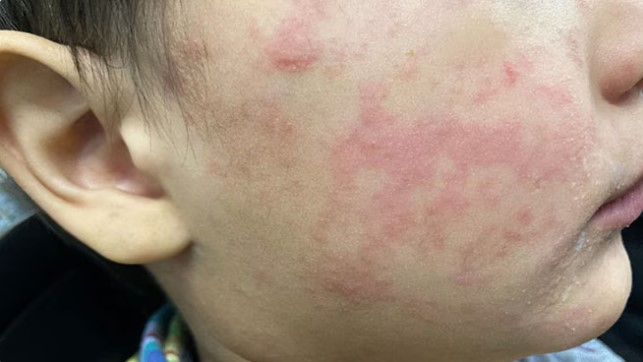Measles Cases Surge in Texas: What You Need to Know About the Highly Contagious Virus
Input
Modified
The Growing Measles Outbreak in Texas Why Measles Poses a Severe Risk to Pregnant Women and Babies Vaccination and Prevention: How to Protect Yourself and Your Community

The Growing Measles Outbreak in Texas
The resurgence of measles cases in Texas has recently caught the attention of health experts, public officials, and communities across the United States. What was once thought to be a disease mostly under control has seen a startling increase in cases, and experts are warning that this could be the start of a much larger public health issue. While the virus initially spread across the western U.S., it has now begun to show up in states further east, including New York and New Jersey. Despite advancements in vaccines and public health awareness, measles continues to pose a significant threat to individuals, especially pregnant women and newborns.
Texas has become a focal point for the ongoing measles outbreak, as the state has seen a rapid rise in cases in recent months. Health officials have expressed concern over the spread of the virus, with reports showing an increase in the number of individuals infected across the state. Measles, once a highly contagious virus that was almost eradicated in the United States through vaccination programs, is making a comeback. In Texas, the increase in cases is alarming for a number of reasons. Measles is a preventable disease, yet the resurgence in cases highlights the gaps in vaccination rates and public health awareness.
One of the key reasons for the rise in cases is the growing number of vaccine-resistant communities across the state. Some individuals and groups refuse to vaccinate their children, citing misinformation and fears about the safety of vaccines. This has led to outbreaks in schools, daycare centers, and other public spaces where people congregate. The highly contagious nature of measles makes it particularly dangerous in areas where vaccination rates are low.

Why Measles Poses a Severe Risk to Pregnant Women and Babies
Measles is especially dangerous for pregnant women, babies, and individuals with weakened immune systems. For pregnant women, contracting measles can lead to severe complications, including premature labor, low birth weight, and even miscarriage. The virus can also be transmitted to the unborn child, putting the baby at risk for serious health problems. Measles infections during pregnancy are particularly dangerous in the early stages, when the baby’s organs and immune system are still developing.
Newborns are at risk because they have not yet received their vaccinations. Babies are more likely to suffer from severe symptoms if they contract measles, including high fever, pneumonia, and encephalitis, an inflammation of the brain that can cause long-term damage. Experts have warned that the virus could spread more easily in communities with high numbers of unvaccinated individuals, further putting pregnant women and infants at risk.
While the current outbreak in Texas is a major concern, it is not limited to just the Lone Star State. In fact, cases of measles are being reported across the country, including in states on the East Coast like New York and New Jersey. These cases have sparked concern among health officials, as they suggest that the virus is no longer confined to areas with historically low vaccination rates, such as the western United States.
The spread of measles across the U.S. underscores the importance of maintaining high vaccination rates and ensuring that communities are protected from preventable diseases. Health experts are urging people to get vaccinated and ensure that their children receive the recommended doses of the measles, mumps, and rubella (MMR) vaccine. Vaccination is the most effective way to prevent the spread of the virus and protect vulnerable populations, including infants, the elderly, and individuals with compromised immune systems.
Despite efforts to contain the measles outbreaks, health experts are warning that the situation may worsen before it gets better. The Centers for Disease Control and Prevention (CDC) has confirmed that the outbreaks are unlikely to subside in the near future. The virus is highly contagious, and it can spread quickly in communities with low vaccination coverage. Public health experts are concerned that as the virus continues to spread, it will lead to more widespread outbreaks and further strain public health resources.
One of the challenges in controlling the measles outbreak is the persistent misinformation about vaccines. In some communities, there is a strong anti-vaccine sentiment, which has contributed to lower vaccination rates. The spread of misleading information about vaccine safety has created an environment where some people are hesitant to vaccinate their children, believing that the risks of vaccination outweigh the potential benefits. This has led to pockets of the population remaining unvaccinated, creating an opportunity for the virus to spread.
Moreover, the COVID-19 pandemic has exacerbated the situation, as lockdowns and restrictions have disrupted routine vaccinations and health services. During the height of the pandemic, many parents postponed or missed their children’s vaccinations due to fears of exposure to the virus or restrictions on in-person doctor visits. As a result, more children are susceptible to preventable diseases like measles, putting them at risk for infection.

Vaccination and Prevention: How to Protect Yourself and Your Community
The most effective way to prevent the spread of measles is through vaccination. The MMR vaccine, which protects against measles, mumps, and rubella, is safe and highly effective. It is recommended that children receive two doses of the vaccine, the first at 12 to 15 months of age and the second at 4 to 6 years old. Adults who have not been vaccinated or are unsure of their vaccination status should consult with their healthcare provider to get vaccinated.
For pregnant women, it is important to ensure that they are protected against measles before becoming pregnant. Women who are planning to get pregnant should check with their healthcare provider to ensure they have received the MMR vaccine or are immune to the virus. If you are pregnant and believe you have been exposed to measles, it is crucial to seek medical attention immediately.
In addition to vaccination, it is important to practice good hygiene to prevent the spread of measles. If you or your child develop symptoms of measles, including a high fever, cough, runny nose, red eyes, and a characteristic rash, it is important to stay home and avoid contact with others to prevent spreading the virus. Measles is highly contagious and can be spread through the air when an infected person coughs or sneezes.
Conclusion
As measles cases continue to rise in Texas and other parts of the U.S., it is clear that the virus remains a significant public health threat. Despite the availability of safe and effective vaccines, the resurgence of measles highlights the need for continued public health education and vaccination efforts. Pregnant women, babies, and individuals with weakened immune systems are at particular risk, and it is crucial that they take steps to protect themselves from infection. The CDC and health officials are urging everyone to get vaccinated and to encourage others to do the same. With the growing threat of measles, it is more important than ever to ensure that communities are protected from preventable diseases. Only through widespread vaccination and education can we hope to control the spread of measles and prevent future outbreaks from occurring.





















